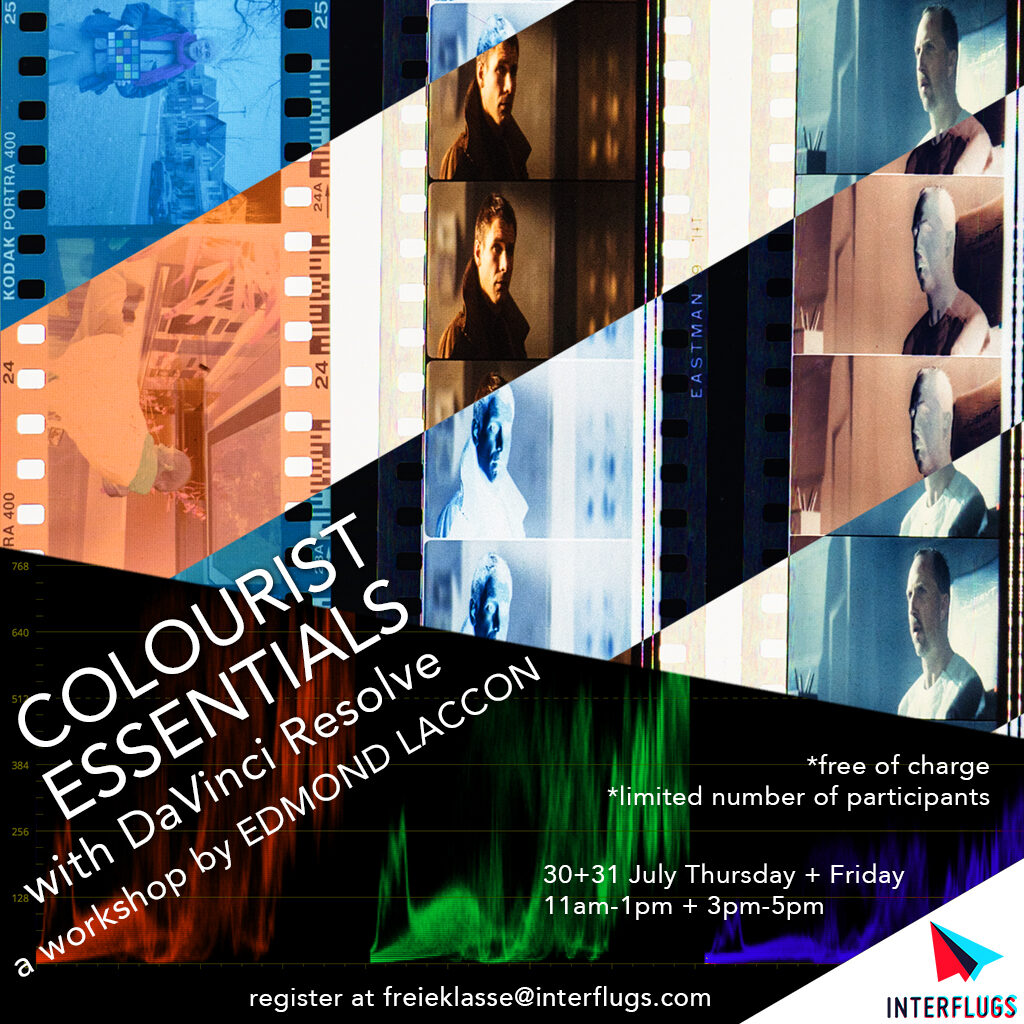[:en]30 – 31 July ::: Thursday + Friday 11am-1pm + 3pm-5pm *limited number of participants* register: freieklasse@interflugs.local
Since the transition to digital cinema in the mid noughties, it’s hard to imagine a creative role more cloaked in misinformation and confused dogmas than that of the colourist.
What precisely do you need to know when starting to grade? What are some best practices? And why do your images often look totally different on different displays? Definitive answers are hard to find.
In this workshop we‘ll cut through the contemporary noise of colourist ‘tips and tricks’ to answer such questions whilst examining the core fundamentals of colour grading in its role of supporting cinematography.
You will learn how, since the early days of moving pictures, cameras and displays have been designed around fooling human perception and how today’s most trusted digital workflows fulfil the same creative demands as analogue photographic technologies did for over 100 years.
You will learn to harness such approaches yourself, getting hands-on with the free version of DaVinci Resolve to transform your video material into clean, consistent and time-efficient results.
This workshop is highly recommended for lens-based artists and those with an appreciation of photochemical film. Bring your questions.
The workshop will be structured as 2 x 2hr sessions on both days.
Edmond Laccon is a graduate of the German Film and Television Academy’s groundbreaking UP.GRADE programme, the world’s first and only long term training programme for colourists. Fortunate to have been educated by many of the most revered names in the post-production industry including Peter Doyle (the Harry Potter and Lord of the Rings films), Dirk Meier (Antichrist), Adam Inglis (Mr. Turner) and Greg Fisher (No Time to Die), Edmond has himself graded over a dozen feature films.
Previously a documentary camera operator and projectionist, becoming a colourist turned Edmond into an obsessive analyser of photographic characteristics and movie looks as well as a passionate supporter in the demystification of colour grading.
The free (i.e. non-‘Studio’) version of DaVinci Resolve is available for Mac and Windows from https://www.blackmagicdesign.com/products/davinciresolve/
Note: Resolve 16 (the latest version) is absolutely not required. Earlier versions going back to Resolve Lite 11 that run on older operating systems and/or hardware will be fine also.[:de]30 – 31 July ::: Thursday + Friday 11am-1pm + 3pm-5pm *limited number of participants* register: freieklasse@interflugs.local
Since the transition to digital cinema in the mid noughties, it’s hard to imagine a creative role more cloaked in misinformation and confused dogmas than that of the colourist.
What precisely do you need to know when starting to grade? What are some best practices? And why do your images often look totally different on different displays? Definitive answers are hard to find.
In this workshop we’ll cut through the contemporary noise of colourist ‘tips and tricks’ to answer such questions whilst examining the core fundamentals of colour grading in its role of supporting cinematography.
You will learn how, since the early days of moving pictures, cameras and displays have been designed around fooling human perception and how today’s most trusted digital workflows fulfil the same creative demands as analogue photographic technologies did for over 100 years.
You will learn to harness such approaches yourself, getting hands-on with the free version of DaVinci Resolve to transform your video material into clean, consistent and time-efficient results.
This workshop is highly recommended for lens-based artists and those with an appreciation of photochemical film. Bring your questions.
The workshop will be structured as 2 x 2hr sessions on both days.
Edmond Laccon is a graduate of the German Film and Television Academy’s groundbreaking UP.GRADE programme, the world’s first and only long term training programme for colourists. Fortunate to have been educated by many of the most revered names in the post-production industry including Peter Doyle (the Harry Potter and Lord of the Rings films), Dirk Meier (Antichrist), Adam Inglis (Mr. Turner) and Greg Fisher (No Time to Die), Edmond has himself graded over a dozen feature films.
Previously a documentary camera operator and projectionist, becoming a colourist turned Edmond into an obsessive analyser of photographic characteristics and movie looks as well as a passionate supporter in the demystification of colour grading.
The free (i.e. non-‘Studio’) version of DaVinci Resolve is available for Mac and Windows from https://www.blackmagicdesign.com/products/davinciresolve/
Note: Resolve 16 (the latest version) is absolutely not required. Earlier versions going back to Resolve Lite 11 that run on older operating systems and/or hardware will be fine also.[:]


